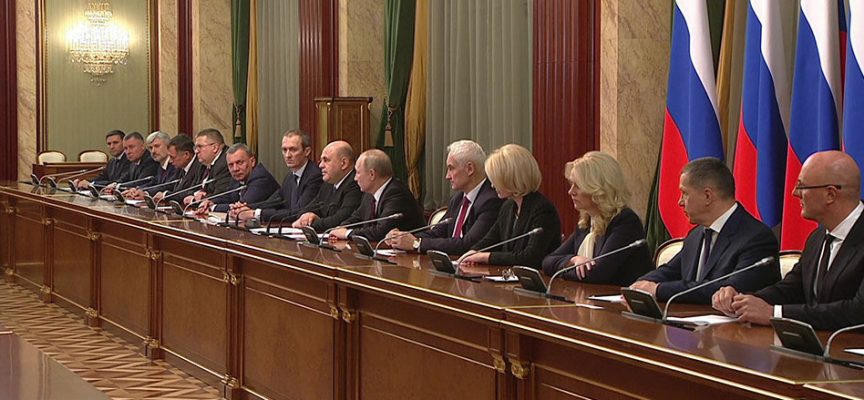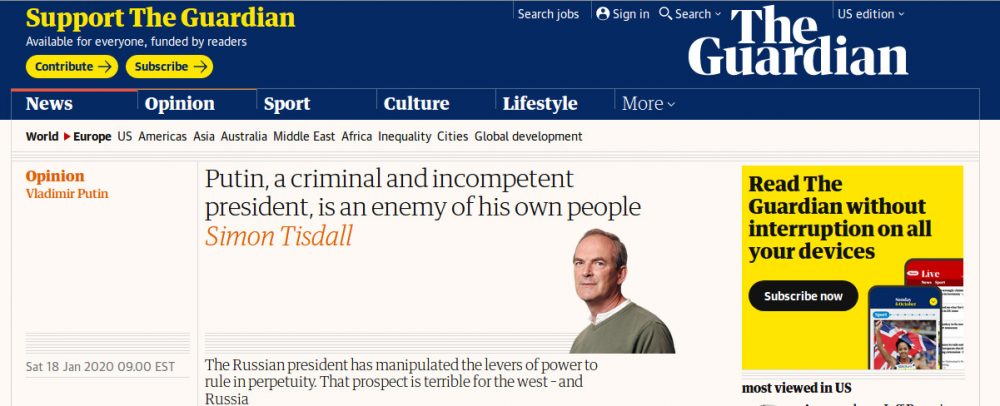The new Russian government: a much needed evolution but not a revolution
By The Saker
[dropcap]T[/dropcap]he suspense is over and we now know the names of all the members of the new Russian government. You can, for example, take this good summary published by RT.
What is important right now is not only what did happen, but also what did NOT happen. I will begin with two extremely important things which did NOT happen:
First, the Russian government has NOT remained unchanged. The naysayers had predicted that nothing at all would change, that the same folks who be sitting in maybe different seats, but that the changes would be primarily cosmetic. That did not happen. In reality 12 people kept their seats and another 9 were replaced.
Second, this was NOT a total gutting of the Atlantic Integrationist block. Most visibly, Anton Siluanov remained as head of the Finance Ministry. However, Siluanov was demoted from his position as First Deputy Prime Minister of Russia which has now been taken by Andrei Belousov, a huge change indeed. As for Medvedev, he was given a “golden promotion” to the largely technical position as Vice Chairman of the Security Council of Russia.
So what has taken place?
Most Russian observers notice two key things:
First, this is a highly competent, technically skilled, government. Truly, and arguably for the first time, each position in the new cabinet is now occupied by a professional whose expertise is recognized by all.
Second, this is very much a non-ideological government. This is not to say that the social and economic policies of Russia will not change, they will and the new government clearly indicates that, especially with the nominations of Prime Minister Mishustin and his First Deputy Prime Minister Andrey Belousov: these are both on record as very much proponents of what is called “state capitalism” in Russia: meaning an economic philosophy in which the state does not stifle private entrepreneurship, but one in which the state is directly and heavily involved in creating the correct economic conditions for the government and private sector to grow. Most crucially, “state capitalism” also subordinates the sole goal of the corporate world (making profits) to the interests of the state and, therefore, to the interests of the people.
In other words, goodbye turbocapitalism à la Atlantic Integrationists!
Russia has now made the fight against poverty a national strategic priority, something which the Russian people had wanted for years and which the previous “economic block” never considered a priority.
Furthermore, the entire Eurasian Sovereignists block of the government has remained unchanged. This indicates two things:
First, the Russian national security and foreign policy will remain unchanged.
Second, the Eurasian Sovereignists have finally weakened the Atlantic Integrationists to such a degree that a Medvedev nicely “boxed in” in the Russian Security Council or a Siluanov “boxed in” in the new Russian government have ceased to represent a serious threat to the future of Russia.
In other words – we can expect the new government to put even much more efforts into the ultimate goal of the full sovereignization of Russia (this goal is also reflected in the new Constitutional changes which will now place Russian national laws above any international treaty or agreements, another longtime goal of the Eurasian Sovereignists).
All I can say here is “finally!!”.
Another important thing which we can note is that Putin decided to work through evolution, not revolution. In fact, he has described this new government as a “balanced” one. There are many, including myself, who would have preferred not to see the names Medvedev and Siluanov again, but there are also many (possibly many more) who seeing these names still present might be reassured that Russia is not about to embark on a radically different political course. Frankly, I think that over the past century Russia has had enough revolutions, wars, big upheavals and terrible tragedies. There IS something to be said for stability and a gradual correction of course.
Furthermore, a new government which appears to have been formed purely on the merit of its individual members can probably generate much more support than a radically ideological one.
Where does all this leave Russia?
I would say that the Eurasian Sovereignists have finally secured their full control over the Russian state and that the demise of the Atlantic Integrationists is now a new fact of life. Since in this new government the only clearly identifiable group besides the Eurasian Sovereignists are the technocrats, this give Russia a much better chance to stand strong and united in the face of an AngloZionist Empire which has now clearly become unpredictable and therefore very dangerous (the murder of Soleimani is the best example of the actions of an Empire which has totally lost any sense of reality).
It is also interesting to note the reaction of the propaganda outlets for the Empire. Here are two of my favorite ones:
 [Filthy enough, and then this, by a certifiable anti-Putin disinformer:]
[Filthy enough, and then this, by a certifiable anti-Putin disinformer:]
While the western “Russia experts” are usually folks who know close to nothing about Russia and the little they do not, they don’t understand, it is reassuring (and, let’s be honest here, heart warming) to see the impotent rage felt by the defenders of the AngloZionist Empire who clearly have lost control of Russia (in spite of being in TOTAL control of the Russia of the 1990s!).
Finally, the appointment of this new government leaves the Russian opposition – both the “official” parliamentary opposition and the so-called “non-system” opposition – in total disarray: the former only pretends to oppose the policies of the Kremlin while the latter is so terminally discredited that it can’t even make it into the Duma. This lack of any credible opposition might appear desirable, especially for those who, like myself, support the Kremlin, but in reality it is just another facet of a much deeper problem: Russia remains a country defined by one person, Putin, and not by a healthy and stable system. The latest reforms did take a few very good steps in the right direction (the Duma’s powers and responsibilities have been increased), but Russia will remain “Putin’s country” for the foreseeable future.
—The Saker

[premium_newsticker id="211406"]
Read it in your language • Lealo en su idioma • Lisez-le dans votre langue • Lies es in Deiner Sprache • Прочитайте это на вашем языке • 用你的语言阅读
[google-translator]
[/su_spoiler]
THE DEEP STATE IS CLOSING IN
![]() The big social media —Google, Facebook, Instagram, Twitter—are trying to silence us.
The big social media —Google, Facebook, Instagram, Twitter—are trying to silence us.

THIS WORK IS LICENSED UNDER A Creative Commons Attribution-NonCommercial 4.0 International License




